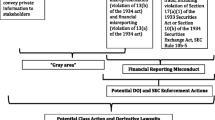Abstract
This paper considers the role of fraud in three major financial debacles; the savings and loan crisis of the 1980s, the Orange County, California bankruptcy of 1994, and the U.S. corporate and accounting scandals of 2002. Using concepts, theories and data drawn from the criminological literature on white-collar crime, and the law and economics literature on corporate governance, a “minimal fraud model” is compared to a “material fraud model” in accounting for the massive financial losses in these three historical cases. The available evidence points to the need for corporate governance models and resulting regulatory policies to explicitly account for the potential for fraud in order to avoid future financial meltdowns.
Similar content being viewed by others
Author information
Authors and Affiliations
Corresponding author
Rights and permissions
About this article
Cite this article
Pontell, H.N. White-collar crime or just risky business? The role of fraud in major financial debacles. Crime Law Soc Change 42, 309–324 (2005). https://doi.org/10.1007/s10611-005-1934-1
Issue Date:
DOI: https://doi.org/10.1007/s10611-005-1934-1




